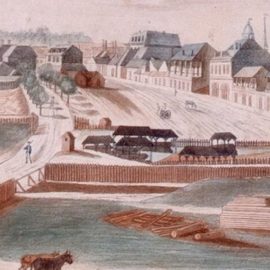
Lumber we need for many things, Just look around you to see how much wood is in your house. Yet, lumber can bring in bugs and the worst one is the Asian Beetle. One ship has a cargo of wood and was infested with these beetles so it was sent home.
Federal agents inspecting a cargo ship near New Orleans ordered it out of the country after finding it infested with a type of Asian beetle that has been destroying trees in the U.S. for about 25 years. They discovered the invasive beetle in wood onboard the Pan Jasmine on July 17, just after the 590-foot-long vessel anchored in the Mississippi River about a mile downriver from New Orleans, according U.S. Customs and Border Protection officials. Flagged under Panama, the ship had previously offloaded a shipment of aluminum in Veracruz, Mexico, after departing a port in India. Wood used to pack the aluminum had not been offloaded in Mexico and was left scattered on the deck of the Pan Jasmine. That appeared unusual to customs agents. “No reason was provided as to why the [wood] was refused discharge in Mexico, and this raised a red flag,” the agency said Wednesday.
nola.com
Sawdust and burring holes were the reason the agents looked closer and they found what was suspected.
The wood was found to have burrowing holes and fresh sawdust. U.S. Department of Agriculture insect specialists identified five pests in the wood, two of them – the beetle and a type of ant – considered serious risks to U.S. crops. The beetle, a member of the Cerambycidae family of longhorned beetles, bores into wood and can feed on a wide variety of trees in the U.S., eventually killing them. The ant, a member of the Myrmicinae family, forms permanent colonies that can compete with native species and damage crops.
The shop was refused entry and it left for the Bahamas to dispose of the wood.
“If the wood had been offloaded into the U.S., it would have been put in a Louisiana landfill where the insects could crawl out and invade the local habitat, causing incalculable damage,” said Terri Edwards, the agency’s New Orleans area port director. Cerambycids were first discovered in the U.S. in New York City in 1996. Native to China and the Korean peninsula, the beetles were accidentally imported into the U.S. via wooden shipping materials. Within two years, infestations resulted in the destruction of almost 7,000 trees and control measures that have cost more than $530 million. If left uncontrolled, Cerambycids and other invasive wood-boring beetles could cause more than $100 billion in damage to the U.S. economy, according to the Agriculture Department.
Other pests were found, but they were ones that have been here for a long time and so are well established. This is good and the reason we have inspection point.



